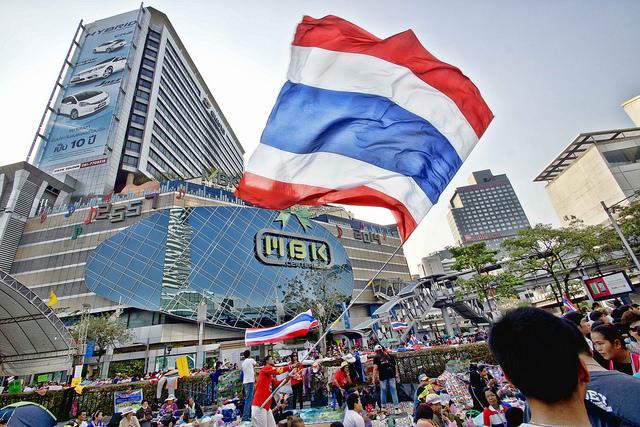Thailand: a new constitution for a new kind of democracy?
Posted By Miles Kupa on May 4, 2015 @ 15:15
For many years Thailand was admired for its rapid economic growth. It was a good security partner for the US and Australia, and many foreigners liked visiting the country. The zigzag course of its political development, alternating between democratically-elected governments and military regimes, has prompted frowns at the appropriate times from Western governments, but the widespread assumption was that there was an underlying upwards trajectory. The election of Thaksin Shinawatra—a wealthy communications tycoon—as Prime Minister in 2001, held out the prospect of a more contemporary and business-oriented style of government.
This new era didn’t last long. A military coup in September 2006 brought Thaksin’s rule to an abrupt halt and he fled the country. Disenchantment with the government imposed by the generals led to street protests and a brutal crackdown by the authorities, resulting in new elections in May 2011. Those were won convincingly by a Thaksinite party headed by his younger sister Yingluck Shinawatra, who formed a new government with the support of minor parties. More conflict between pro- and anti-Thaksin forces, and conviction of Prime Minister Yingluck in the constitutional court on charges of abusing power, led to yet another military coup in May 2014.
The leader of the military junta and new Prime Minister, Prayuth Chan-Ocha, operating under martial law and an interim constitution, promised a new constitution and elections (now forecast for early 2016). On 1 April this year, martial law was replaced with legislation under Article 44 of the interim constitution, ushering in what was described as a ‘new security order’. However the move has been strongly criticised by the regime’s opponents and others as a cynical manoeuvre which accords the Prime Minister even more powers than he exercised under martial law.
A new draft constitution, prepared by a Constitution Drafting Committee appointed by the government, has recently been distributed to political parties for their feedback—though with a caveat that the parties aren’t permitted to hold meetings to discuss the text. Apparently the draft provides for a proportional representation electoral system, a Senate with two-thirds of its members appointed by the government and—most controversially—the possibility of an unelected PM. Initial reactions have been hostile. Abhisit Vejjajiva, the leader of the Democrat Party, Thailand’s oldest, was reported as saying that it would lead to a ‘parliamentary dictatorship’, and that if it weren’t amended and there was no referendum on the matter, the new charter would be a ‘time-bomb that will create conflicts no less severe than previous ones’.
The prospects for the draft of this latest constitution, which would be Thailand’s 20th since the overthrow of the absolute monarchy in 1932, are not good. As previous coup leaders have found, leaping onto the tiger is easier than getting safely off. More broadly, the prospects for restoring a consensus-based political system aren’t promising either.
The reality is that the Thai polity has become deeply and bitterly divided. There are a number of reasons for this. One is that the populous northeast of the country—known as Isaan and long looked down on by the Bangkok elite—has developed a new sense of its distinctiveness and political weight in a democratic system. This region, along with Thaksin’s home base in the north, has become a bastion of support for him, including among the many northeasterners toiling in Bangkok. A generous and expensive scheme to prop up the price of rice paid to farmers helped sustain support for Thaksin and Yingluck.
Thaksin rose from outside the traditional aristocratic, bureaucratic and military elite clustered around the Royal Palace, but with the legitimacy conferred by electoral victory—notwithstanding the taint of money politics. Fundamental to explaining the divisions in Thai politics today is that there’s a clash of legitimacies. (One Thai friend acknowledged this point to me but commented that surely democracy should trump any other legitimacy.)
All this is being played out against the background of the last phase of His Majesty King Bhumipol’s reign, and, inevitably, the question of royal succession. Some observers see political players as positioning themselves for this eventuality and interpret their actions from this perspective.
Social media has also played a role in exacerbating political tensions. The regime has clamped down on the mainstream media, namely the press and television, but the new media have proved harder to control. News, views and opinions, and even guidance on where to gather for protests, are readily shared online. The government has introduced various rules and measures to try to discipline the new media, but it’s not an animal that is easy to tame.
Thailand’s political turmoil over recent years has had an economic impact. Growth has slumped; foreign investors are more cautious about the country’s prospects.
Thailand’s foreign relations have also been affected, as the United States and other Western nations wait for a return to democratic government before resuming close ties. In the meantime, Russia and China are seizing the opportunity to cultivate the regime; Medvedev visited recently [2]. In the ASEAN context though, Malaysia is also slipping backwards, so for Australia and others the search for respectable friends has become harder. Indonesia, anyone?
Article printed from The Strategist: https://aspistrategist.ru
URL to article: /thailand-a-new-constitution-for-a-new-kind-of-democracy/
URLs in this post:
[1] Image: https://aspistrategist.ru/wp-content/uploads/2015/05/12256651454_89b61c46a7_z.jpg
[2] visited recently: http://www.themoscowtimes.com/business/article/russias-medvedev-heads-to-thailand-for-talks-on-trade-tourism/518712.html
Click here to print.
